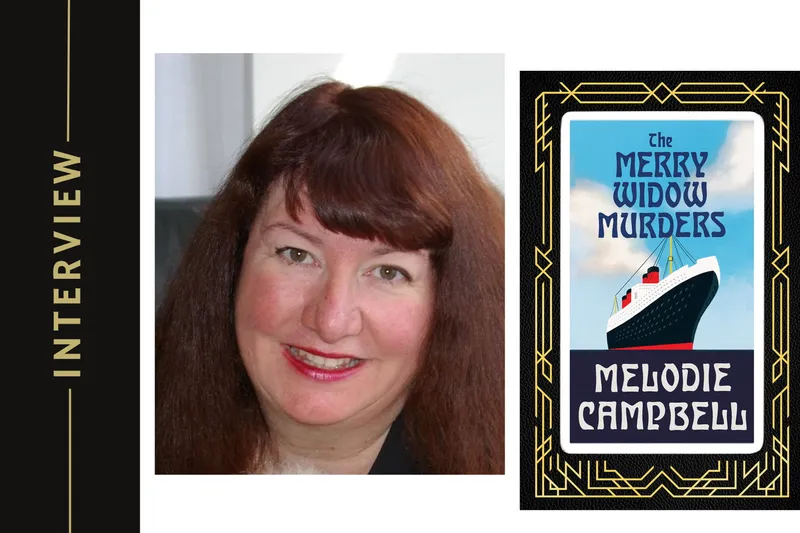Called the “Queen of Comedy” by the Toronto Sun, Melodie Campbell has won ten awards for crime fiction, including the Crime Writers of Canada Award of Excellence. Her publications include over 100 comedy credits, 17 novels, and 60 short stories. Her most recent book, The Merry Widow Murders, earned the following praise from Maureen Jennings, author of the Murdoch Mysteries television series: “Delightful…The 1920s shipboard setting is beautifully observed; the plot will keep you guessing and the heroine, is … well …delightful. Not to be missed.”
Could you tell us briefly what your latest book, The Merry Widow Murders, is about?
Melodie Campbell: Lucy Revelstoke, unconventional widow of a young British lord and daughter of a Canadian mobster, is crossing the Atlantic in 1928. Rubbing shoulders with the era’s elite and reconnecting with her late husband’s aristocratic friend Tony should make for a swell trip. But a dead body dumped in Lucy’s stateroom the first night of the voyage threatens to capsize the new life she’s built for herself.
Who is this dead man? Together with her pickpocket-turned-maid and Tony, Lucy rushes to investigate, just steps ahead of the authorities who will certainly dig too deeply into her dodgy Canadian past.
How did you come up with the title to your book?
MC: That was easy. First off, I like a title to give the reader a good idea of what the book will be about. So no one-word titles for me. In this case, my protagonist is a widow, the book is humorous, so Merry Widow, and the genre is murder mystery. Thus, The Merry Widow Murders tells the reader this will be a light murder mystery starring a widow. The cover border hints it will be in the Art Deco time period, and the ship on the cover gives the setting.
The Art Deco border on the cover immediately caught my eye! Art Deco style originated in France in the 1910s and was inherent — not just in paintings — but also in architecture, fashion, cars and ocean liners. The style hinted at leisure, travel and pleasure, which is absolutely perfect since The Merry Widow Murders is set on a state-of-the-art ocean liner in 1928.
While writing the book, what was the most surprising thing you discovered or learned?
MC: I suppose the most surprising thing was how many hours of research I actually had to do! It was important to me to get the era correct, and that means making sure the songs I had playing, the drinks I had people drinking, actually existed by 1928. Lots of Google searches!
But the thing that stands out for me is the status of women. I picked 1928 because I knew that was the year that women finally got the vote in England. Lucy Revelstoke is a young widow in her 30s. As a widow, she has agency; the inheritance she received from her beloved late husband is hers alone. But should she marry again, that property becomes marital property, and her husband could gamble it away, for instance. He would have power over the household and could dismiss her beloved maid, for instance.
The Magna Carta – the old laws of England established after the Norman conquest – did one good thing for women. It decreed that widows could not be forced to remarry. Now, the men who established the law weren’t doing it to help women. They were more concerned with making sure that a new husband didn’t take the property away from the late husband’s family. But that law gave widows agency for the first time, and my protagonist is loathe to give that up.
If you could have lunch with one of your characters from the novel, which one would it be and why? And where would you choose to meet for lunch? This question of course would involve a little time travel…
MC: I would definitely want to meet Lucy Revelstoke who could very well have been an ancestor of mine. We would have lunch on board the Victoriana ocean liner, in the Art Deco dining saloon. And we wouldn’t skip dessert! Like Lucy, I’ve always felt sorry for the women on the Titanic who passed on dessert…
Chocolate and vanilla éclairs, French ice cream, assorted fresh fruit… It would take a lot of willpower to resist dessert! To find out more about the food that would have been served on a luxury ocean liner at the time, readers can explore the exclusive dining experience and menus.
Lucy Revelstoke is the daughter of a Canadian mobster. In your The Goddaughter Series, Gina Gallo is an Italian mob goddaughter who doesn’t want to be one. You’re known for your witty humor and tongue-in-cheek one-liners. What’s the appeal of mobsters, especially when writing a comedy caper?
MC: I like to write good-natured comedy – the type that comes from situations that go wrong, and quirky characters. I love capers – generally heists that go wrong – and found that using a reluctant Goddaughter would give me the conflict I needed to create comedy. She doesn’t want to be doing this, so when things go wrong, she even MORE doesn’t want to be doing this, and that leads to great banter. In Merry Widow, Lucy and her pickpocket-turned-maid Elf have the same kind of banter, as each is trying to keep their past under wraps.
When it comes to plotting your novels, do you have the whole book outlined before you write? Do you use any specific strategies or techniques?
MC: I’ve taught writing for 30 years, so you won’t be surprised to find that I do outline. I work from a three acts and a finale structure, meaning I don’t outline every chapter, but I know before I start who the victims will be, who the killer will be, and why. Partly, I have to do this because my agent sells the book before it’s written. They require a full synopsis before extending an advance. If you were to look at the fireplace mantal beside my desk here, you would see piles of sticky notes pasted on there, with scenes I have yet to write. I just pull them off once the scenes are written! It gives me a warm kind of satisfaction to physically see progress.
What was the best writing advice you ever received?
MC: If you want to be admired, get a dog. (smile – No truly. If you are in this game for anything other than the love of writing, you are going to be disappointed. So love writing for it’s own sake.)
Here’s a sneak peak at The Merry Widow Murders…
1928, AT SEA
On the cabin floor next to the bed, lay a man. His hair was slicked back, and his suit was New York slick. But it could have done without the dagger through the chest.
“Good gad, Lucy,” said Tony. “Don’t go any closer.” He threw an arm up in front of me to block the way. “Who the devil did this?”
I stared down at the body. “Not me, darling. And if I had, it wouldn’t be this way.”
“Sonovabitch,” said my maid Elf. She leaned in from the doorway behind us. “Who is that?”
“Shut the door behind you,” I ordered.
Elf, full name Elfreda, did as told, for possibly the very first time in her life. She came up beside me and peered down at the body.
“Know him?” I asked.
“Nope.”
I glanced over to assess her visage. Everything Elf thought showed up on her face. It wasn’t a particularly good quality for a servant to have. Mind you, calling her a servant was a trifle optimistic.
She poked the body with her foot.
“Why wouldn’t you have done it this way?” asked a male voice.
Good lord! I’d forgotten Tony was there.
Elf answered for me. “Ruin a perfectly good gown, stabbing someone. Blood spray goes all over you.”
Tony stared at her. “Yes, well…there is that.” He appeared to be choking back a laugh. Or maybe he was just choking.
Visit Melodie Campbell on social media!

About Vanessa Westermann
Vanessa is a Canadian crime writer. She is the author of Cover Art and other books. At the heart of all of her stories are strong female protagonists.

